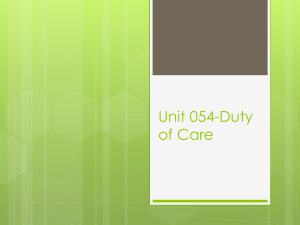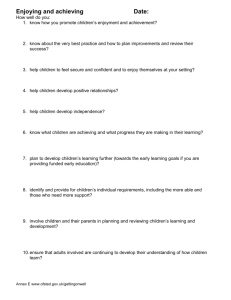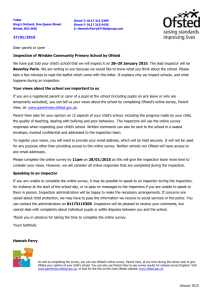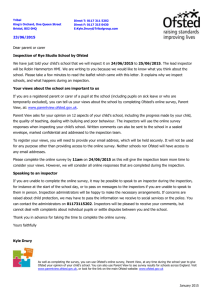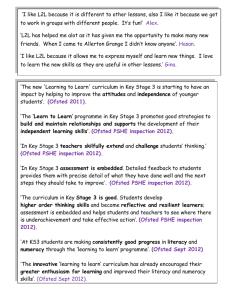Partial Regulatory Impact Assessment (RIA) for the proposed Child
advertisement
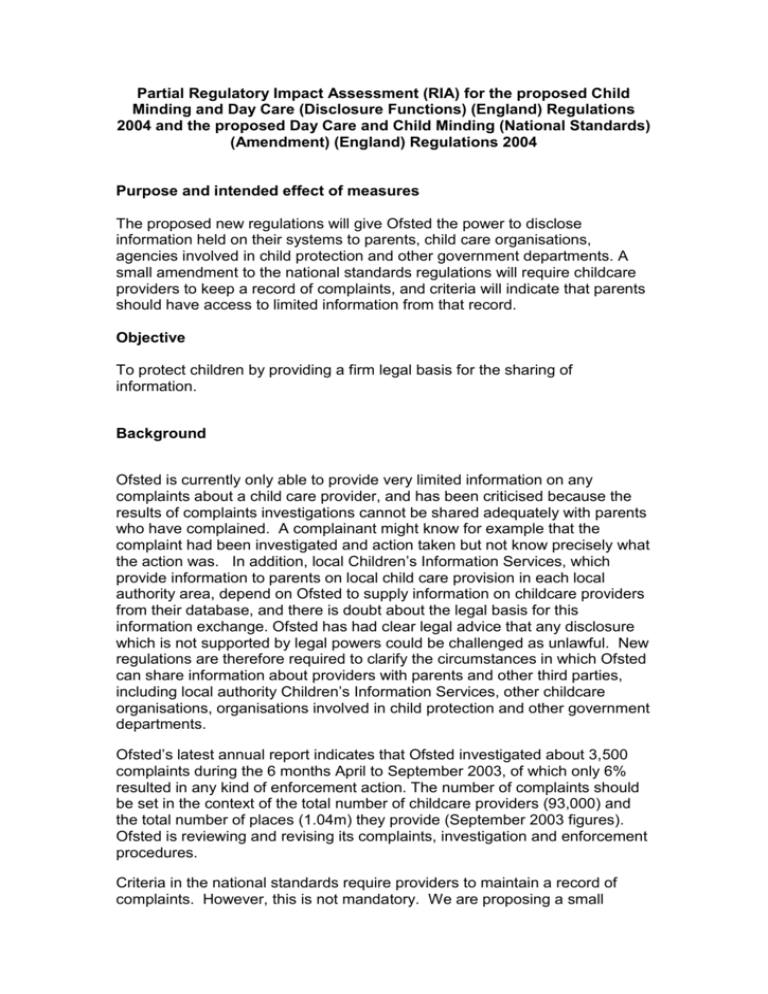
Partial Regulatory Impact Assessment (RIA) for the proposed Child Minding and Day Care (Disclosure Functions) (England) Regulations 2004 and the proposed Day Care and Child Minding (National Standards) (Amendment) (England) Regulations 2004 Purpose and intended effect of measures The proposed new regulations will give Ofsted the power to disclose information held on their systems to parents, child care organisations, agencies involved in child protection and other government departments. A small amendment to the national standards regulations will require childcare providers to keep a record of complaints, and criteria will indicate that parents should have access to limited information from that record. Objective To protect children by providing a firm legal basis for the sharing of information. Background Ofsted is currently only able to provide very limited information on any complaints about a child care provider, and has been criticised because the results of complaints investigations cannot be shared adequately with parents who have complained. A complainant might know for example that the complaint had been investigated and action taken but not know precisely what the action was. In addition, local Children’s Information Services, which provide information to parents on local child care provision in each local authority area, depend on Ofsted to supply information on childcare providers from their database, and there is doubt about the legal basis for this information exchange. Ofsted has had clear legal advice that any disclosure which is not supported by legal powers could be challenged as unlawful. New regulations are therefore required to clarify the circumstances in which Ofsted can share information about providers with parents and other third parties, including local authority Children’s Information Services, other childcare organisations, organisations involved in child protection and other government departments. Ofsted’s latest annual report indicates that Ofsted investigated about 3,500 complaints during the 6 months April to September 2003, of which only 6% resulted in any kind of enforcement action. The number of complaints should be set in the context of the total number of childcare providers (93,000) and the total number of places (1.04m) they provide (September 2003 figures). Ofsted is reviewing and revising its complaints, investigation and enforcement procedures. Criteria in the national standards require providers to maintain a record of complaints. However, this is not mandatory. We are proposing a small change to the national standards regulations which will give legal force to this requirement, enabling Ofsted to report on this as part of the inspection, and to the supporting criteria indicating that parents should be able to access limited information from that record. Risk assessment The proposed regulations clarify the grounds upon which information about child care providers can be shared with other agencies and parents. Although Ofsted may pass on particular pieces of information in the interests of protecting children, without clear regulations the way is open for legal challenges under data protection legislation. Although there have been no legal challenges to date, and consequently the risks may be judged as insignificant, we believe that in this complex area of data protection it is important to address this risk . It is also important that the requirements on complaints records are strengthened so that providers are clear that this is a key aspect which Ofsted will look at and report on as part of their inspection. Parents have sought more information and without the proposed regulations will continue to feel both that inspection reports generally do not adequately cover the level of complaints received by a particular childcare provider and how they are being handled, and that they do not have easy access to such basic information from their own childcare provider. Options These regulations have been proposed in order to address concerns about the current arrangements which have come to light since Ofsted took over responsibility for regulating childcare under the Children Act 1989. Maintaining the status quo is clearly an option, relying on guidance and protocols, but without new regulations Ofsted will have to continue to work with what it considers to be an unsatisfactory legal basis for providing information to third parties, with the consequent risk of expensive litigation. A key aspect of these regulations is the strengthened requirement that providers keep records of complaints for sharing with parents and Ofsted. We have considered whether or not the regulations should prescribe in detail what those records will contain, and have concluded that this would be better covered in guidance. This guidance is currently being considered in consultation with national organisations representing different groups of providers. Maintaining the status quo would not address the concerns that some parents have expressed about the lack of information providers are obliged to share. Nor would it encourage the kind of transparency that we believe should be a hallmark of a good provider. . Benefits As explained above, the proposed regulations will give parents peace of mind by establishing a more transparent system for reporting back to parents the results of complaint investigations, and for keeping and sharing complaints information where a contractual relationship exists. Ofsted will be able to pass on information about the setting itself, any conditions attached to the registration, information about the quality of provision and information about any enforcement action taken by Ofsted or a local authority following a formal request to do so. In addition the proposed regulations will allow Ofsted to pass on relevant information about a childcare provider to local authorities, fostering and adoption agencies and to other government departments. The main benefit is that these regulations set a clear legal framework which gives Ofsted the discretion needed to pass on information that may be of benefit to a parent or to an agency that has concerns about the protection of children. Costs Ofsted already expects childcare providers to keep a complaints record – this is in the criteria which support the national standards – and this features amongst the documentation that an Ofsted inspector looks at during the inspection process. Ofsted has calculated that it will cost £50K to implement the new regulations into their operational systems but this will be absorbed within existing budgets. Our information suggests that making this requirement mandatory is very unlikely to impose additional costs on providers, although this will be tested during the consultation. To make sure that any compliance costs are kept to a minimum, and to reduce the risk of any other adverse impact as a result of the regulations, Ofsted is working with provider organisations on guidance about complaints handling and record keeping. This guidance will indicate the kind of complaints that would be covered by the new arrangements, what records Ofsted might expect to see during an inspection, and the level of information that it would be appropriate for a parent to see. In producing such guidance we would address the principal concerns that providers might have as well as offering advice about such issues as data protection. Ofsted believe that the work they intend to do with provider organisations to draw up a standard complaint record, which all providers will use, will negate any additional costs to them. Taken together we believe that the package of new regulations and guidance will help to protect providers against the expensive litigation that might arise from an inappropriate or illegal sharing of information. Business sectors affected The registered childminding and day care sector. This covers childcare providers in the private, voluntary and public sectors, the majority of which would be self employed childminders (around 70,000 are currently registered) and small businesses operating day care services (there are about 30,000 day care providers). Sustainability in the sector is an issue, with many childcare providers operating on very low or non-existent profit margins, particularly childminders and voluntary sector day care providers. Some day care providers form part of larger companies, for example chains of day nurseries, where economies of scale have created greater viability. Equity and fairness Some childminders and day care providers may feel that the proposals are unfair because they will require them to be too open about the history of their childcare provision and any complaint that has been made to them, with reference to complaints appearing in a published inspection report, even when a number of complaints may be nothing to do with the quality of provision (for example, a provider may get complaints from parents about a fee increase). In addition, there may be complaints records which could be misinterpreted by a parent in the absence of adequate explanation, such as the suspension of a registration when a significant incident requires further investigation, but which results in the exoneration of the provider and lifting of the suspension. However, the guidance that will be produced in discussion with sector organisations will help to allay any such fears from providers. The proposed arrangements will encourage transparency. Parents should have access to information which enables them to make judgements about the care so that they can be assured that their children’s needs are being met and a childcare provider will normally have nothing to hide. Unintended consequences The disclosure regulations potentially create the opportunity for underhand practice: for example, a nursery filing a series of spurious complaints against a competitor, which would have to be disclosed, therefore giving the nursery an unfair advantage – anecdotal evidence suggests that in some places there is local rivalry to fill childcare places. However, the guidance will help to safeguard providers by explaining how such complaints should be handled and recorded, and we believe that any risks associated with this are outweighed by the significant benefits from the greater transparency that the regulations will bring. Low profit margins in the sector mean that any increase in costs, however small, could have a negative impact. Again, this risk will be addressed by the guidance supporting the proposed regulations. Small Firms’ Impact Test Discussions with representatives of provider organisations whose membership covers the majority of small firms in the sector have not identified any specific additional costs that would be incurred because of these regulations. Further discussions will now take place as part of stage one of the small firms impact test to examine whether small businesses in the sector will incur extra costs as a result of these proposals. During our initial soundings with the provider organisations concerns were raised as to how complaints were defined and recorded, and about how such complaints information would be shared with parents. Full guidance will be prepared and issued after consultation with provider organisations. If any cost or other impact issues are raised as a result of the consultation, these will be addressed and reflected in revisions to this impact assessment. Competition Assessment None identified other than the point raised under “unintended consequences” above. Enforcement and sanctions If childcarer providers fail to comply with the regulations sanctions can be applied in accordance with the normal enforcement procedures operated by Ofsted. Legal proceedings are only taken against providers where a range of other measures have failed to result in compliance, and/or where there is a serious risk of children coming to harm. As a first step providers will normally be encouraged need to see that it is in their own interests to be open and honest with parents. Consultation Consultation over a 12 week period, with organisations and individuals that have an interest in the day care and childminding sectors, will inform preparation of a full regulatory impact assessment. Monitoring and review We will evaluate the effectiveness of these regulations within the first 24 months of operation. This evaluation will be undertaken with Ofsted, and will include statistical analysis of complaints made to Ofsted and a review of a sample of inspection reports. Following this evaluation we will consider a further revision of the regulations if the need for changes is identified. Summary and Recommendation The key issue in developing our policy on disclosure of information was to ensure that Ofsted have a clear legal basis for passing information to parents and other agencies. Although there are still some outstanding issues about the way in which complaints information will be recorded by providers, it is clear that these proposed regulations will provide Ofsted with the legal framework they seek and will have the effect of making the complaints procedure more transparent for parents. Doing nothing or watering down these regulations would not achieve those aims and may not in some circumstances enable Ofsted to pass on to others information that raises doubts about a provider’s ability to care for children. We therefore recommend that Ministers agree in principle to these regulations and further consultation on them for the reasons outlined in this RIA.

